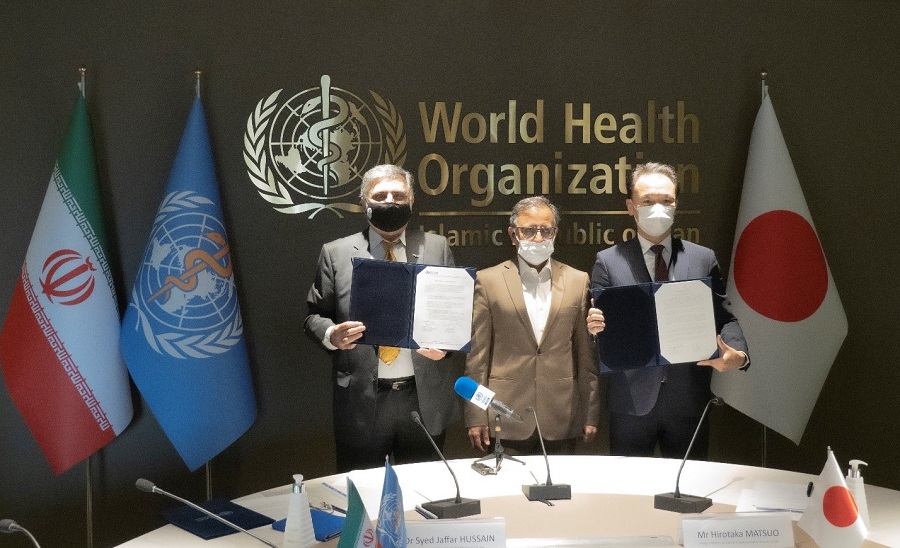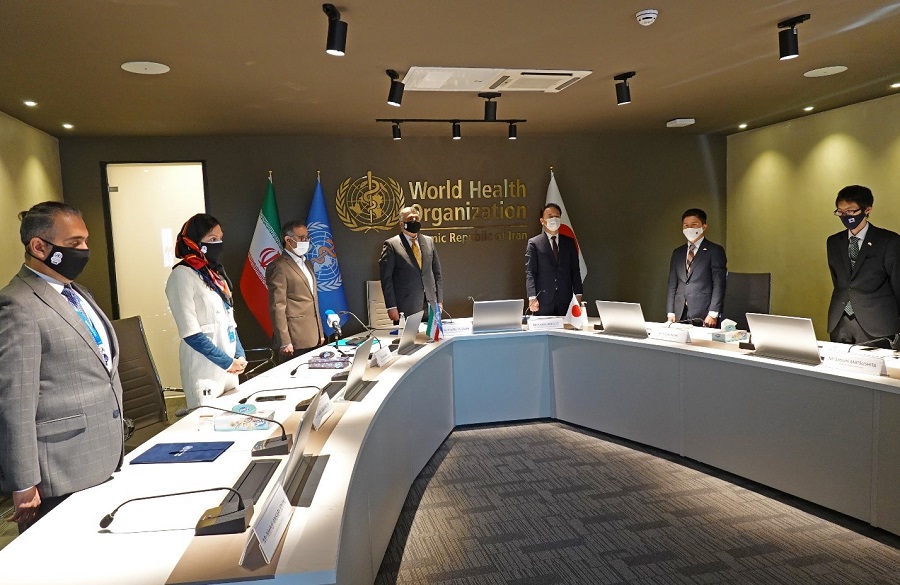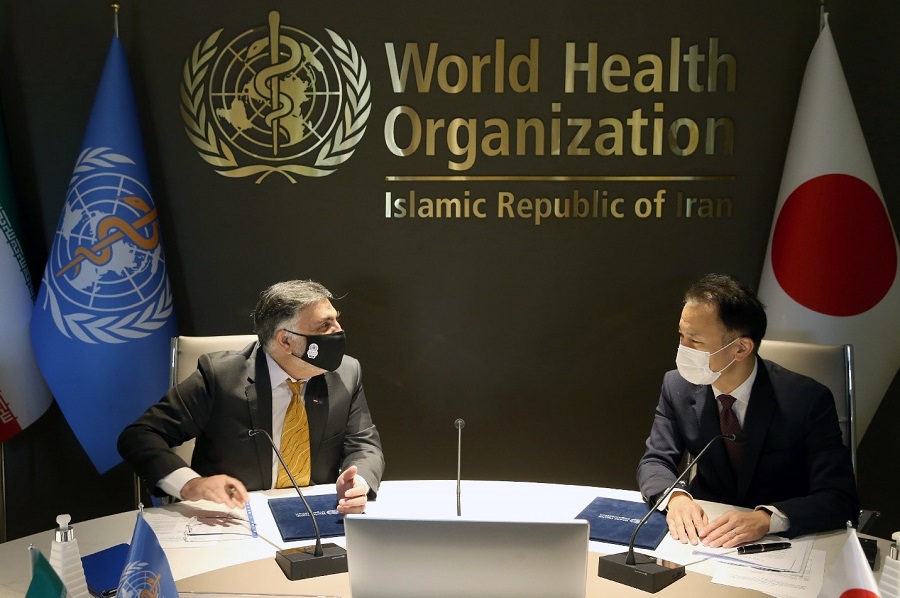 (Left to right) Dr Syed Jaffar Hussain, WHO Representative and Head of Mission to Islamic Republic of Iran, Dr Jalal Naeli, Deputy Director General of International Relations Department at the Ministry of Health and Medical Education, and Mr Hirotaka Matsuo, Charge d'Affaires ad interim in Japan to the Islamic Republic of Iran, pose for a picture with the signed grant agreement during a ceremony in Tehran on Tuesday 26 October 2021. Photo: WHO country office in Islamic Republic of Iran
(Left to right) Dr Syed Jaffar Hussain, WHO Representative and Head of Mission to Islamic Republic of Iran, Dr Jalal Naeli, Deputy Director General of International Relations Department at the Ministry of Health and Medical Education, and Mr Hirotaka Matsuo, Charge d'Affaires ad interim in Japan to the Islamic Republic of Iran, pose for a picture with the signed grant agreement during a ceremony in Tehran on Tuesday 26 October 2021. Photo: WHO country office in Islamic Republic of Iran
Tehran, 26 October 2021 – The Government of Japan has renewed its long-standing solidarity with the Islamic Republic of Iran by signing a project agreement with the WHO country office to support efforts to strengthen the COVID-19 response across the country.
The financial donation agreement was signed between Dr Syed Jaffar Hussain, WHO Representative and Head of Mission to Islamic Republic of Iran, and Mr Hirotaka Matsuo, Charge d'Affaires ad interim in Japan to the Islamic Republic of Iran, during a ceremony in Tehran on Tuesday 26 October 2021, attended by Dr Jalal Naeli, Deputy Director General of International Relations Department at the Ministry of Health and Medical Education.
 Photo: WHO country office in Islamic Republic of Iran
Photo: WHO country office in Islamic Republic of Iran
The grant aid project worth US$ 6.3 million will provide a total of 6 MRI machines to the Islamic Republic of Iran to strengthen its capacity to address the ongoing COVID-19 epidemic in the country. The MRI machines will be delivered to public hospitals in 6 provinces, namely Tehran, Khuzestan, South Khorasan, North Khorasan and Chaharmahal and Bahtiari, and the WHO country office will be responsible for the procurement and delivery of the items.
Dr Hussain expressed his gratitude to the Government of Japan and the Japanese Embassy for their support which will greatly support the health care system in responding to the COVID-19 epidemic.
“I would very much like to thank the Government of Japan, and His Excellency Mr Aikawa Kazutoshi, the Ambassador of Japan to the Islamic Republic of Iran for making this grant available to the country through WHO,” he said. “The US$ 6.3 million grant will greatly facilitate the effective response of the Government to COVID-19, particularly in diagnostic and therapeutic aspects. The MRI machines which WHO will procure through this grant will not only serve the COVID-19 response, but in the medium to long term address many other significant illnesses and diseases.”
“The coronavirus infection rapidly expanded all over the world and threatened not only human lives but also the world’s economy. From the very beginning of the pandemic, the Government of Japan has considered that the emergency response to protect human lives and minimize socioeconomic impacts has been essential,” said Mr Matsuo. “I am convinced that these 6 MRI machines will contribute to preventing the further spread of the coronavirus infection in each region and will help local people cure diseases.”
 Photo: Ehsan Naderipour
Photo: Ehsan Naderipour
Mr Matsuo underlined that improving the health sector was one of his embassy’s key priorities. “Japanese knowledge and technology in this sector can play a key role in strengthening relations between Japan and Islamic Republic of Iran,” he noted.
While thanking the Government of Japan for their donation, as well as the previously provided support to the Ministry of Health and Medical Education, Dr Naeli expressed hope that the current and similar collaboration in the future would help support those most in need.
Mr Matsuo also thanked the Ministry of Health and Medical Education and Ministry of Foreign Affairs, as well as WHO, for all the efforts made to combat COVID-19, and said he hoped that the world would soon overcome the challenges posed by the pandemic.
 Photo: Ehsan Naderipour
Photo: Ehsan Naderipour
Since the emergence of COVID-19 in early 2020, the Government of Japan has donated about US$ 34 million to support Islamic Republic of Iran in combating the pandemic through partnerships with various United Nations agencies in the country including WHO, United Nations Development Programme, International Organization for Migration, the UN Refugee Agency, World Food Programme and International Federation of Red Cross and Red Crescent Societies. The support provided by the Government of Japan includes provision of a considerable number of CT scanners, echo sonographies, ABG analyzers along with their consumables, ventilators, portable ventilators, in addition to partial financing of an x-Ray angiography machine and a portable digital x-Ray system to tackle COVID-19.
The Government of Japan has also supported Islamic Republic of Iran by procuring about 3 million doses of Japanese-made AstraZeneca vaccines in July 2021 when the country was going through the immense fifth wave of the pandemic. The current project comes at a critical time and will significantly contribute to national preparedness to respond to the COVID-19 crisis through health facilities across the country.


